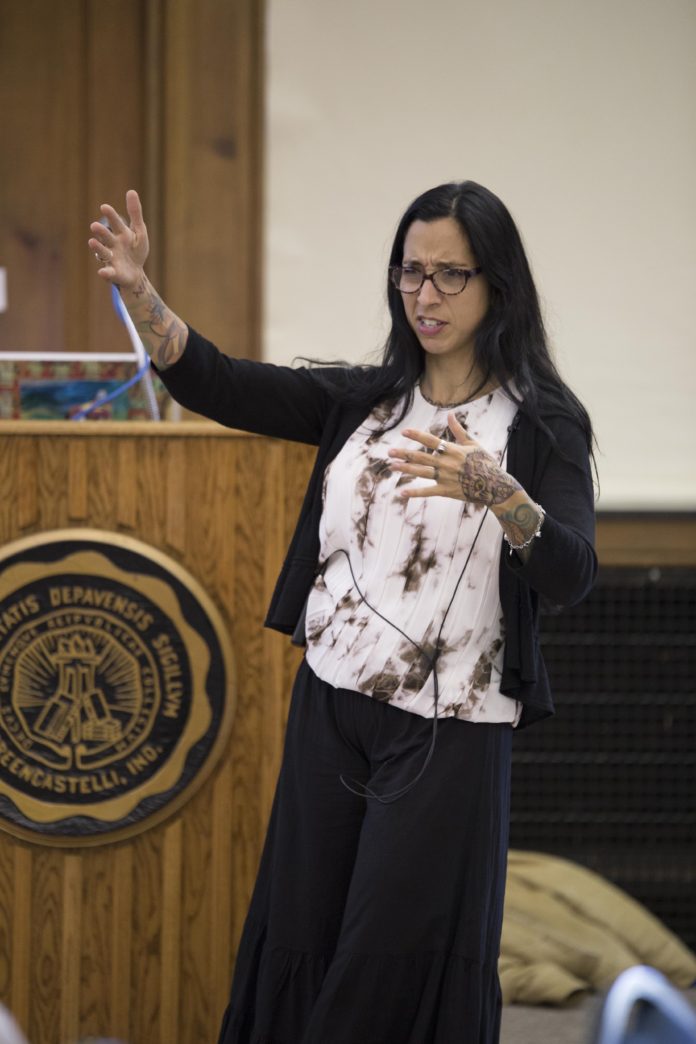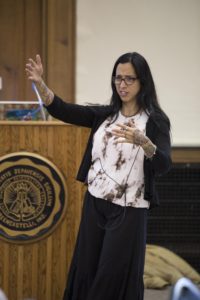

While some professors take a sabbatical year to further their professional careers through book-writing or research, Associate Professor of Sociology, Alicia Suarez, did research but she also taught students at the Indiana Women’s Prison (IWP).
Suarez taught “Women and Health,” which she has taught at DePauw before. The course covers the medicalization of women’s bodies as a way to take control over women’s choices. The summer before teaching at the prison, she had a call-out meeting with the students interested in the class. There, they developed and tweaked the syllabus to meet the students’ needs.
“It was interesting because the students did not want the section I normally teach about birth and pregnancy. Most of the women had kids and didn’t care to learn more about it. I was sad about omitting that section since it’s my favorite to teach,”Suarez said. The course focused more on such topics like theory, breast cancer, menstruation, reproduction and sexuality.
Suarez has been teaching for 15 years, and received her undergrad and PhD for Sociology at Indiana University in Bloomington. She describes herself as a “woman, mother, racially ambiguous, heavily tattooed… I have friends and family involved in criminal justice system and have volunteered at IWP for a few years prior to teaching this class.”
The IWP, founded in 1873, is situated in Indianapolis and holds 600 students. Since it is in a city instead of a rural area, the IWP tends to house women with chronic illness, mental illness, or are pregnant. “The fact that this prison even has a college program is very noteworthy. IWP is progressive for prisons. The prison administration is very supportive to classes like mine,” Suarez said.
Suarez started with 21 students, mostly white and English-speaking. Within two weeks, she was down to 13 students. There were an array of reasons for women dropping the course: one woman transferred prisons, and some had to attend other mandatory classes that conflicted. The course finished with eight students, and several dogs.
“[The dogs] were distracting at first, but I got used to it,” Suarez said. Three of the women participated in the Indiana Canine Assistant Network (ICAN), which the ICAN website comments is a program to “support the development and use of humane and effective companion animal population management worldwide.”
Along with canine students, Suarez had a number of differences between teaching at the IWP instead of DePauw. For one, she had much less control over the environment: officers would pop into the classroom, the “voice of Oz” intercom (a name given by the students) would interrupt her teaching, classes would be cancelled or cut short, and all supplies and rooms had to be unlocked by IWP staff.
The lack of resources was also an issue. “At DePauw, for the most part, [professors] can choose whatever books they want on a syllabus with the expectation that students will purchase them. Yes, the prices of books are considered, but we basically have free reign on book choices,” Suarez said. “ At the prison, they have no access to purchasing books. In order to teach effectively, I had to be a bit creative.” She was able to crowd source books through Facebook and friend connections for her IWP students to be properly equipped for her class.
“I was nervous on the first day bringing the books through security; I wasn’t sure if they would let me bring them in. Here’s me, walking through the scanners with a box of The Technology of Orgasm books. Instead of confiscating the books, one of the security guards saw it and started laughing, saying he wanted to take the class,” Suarez said.
The lack of technology was also a major departure from DePauw teaching. “They didn’t have laptops or any access to computers, so I couldn’t email them and they couldn’t email me. For group projects, classmates couldn’t text each other to meet up, they had to find ways to go around this,” Suarez said.
Religious Studies professor, Jeff Kenney, has considered teaching at an Indiana prison. “We have so much in our [university] classrooms, and there’s this foundational pedagogy that professors are used to. So how do we address students without technology and hold their attention?” said Kenney. “People that go into prisons can’t take stuff with them, and even basic things like markers and pencils are controlled. When professors teach in a prison, they’re retooling what teaching means when you don’t have all of the bells and whistles.”
Suarez said there was a wide range of skill sets and experiences from the women, and her students were not afraid to show their insecurities. “[The women] could bring a lot more to the table because they have ‘lived’ and are much more comfortable with talking about trauma and abuse than DePauw students,” Suarez said. “They were able to take concepts in the course and apply them with more depth...Some of my best students at the prison were on par with my best students here.”
Despite the challenges, Suarez would teach a class at IWP again if given the chance. She believes her experiences at the prison have already changed the way she thinks about DePauw.
“Alicia recognizes the value of all people even it society doesn’t,” said Maggie Wetzel, a senior at DePaadvisee of Suarez. “She doesn’t consider herself a saint because she works with marginalized women, but she recognizes that there is a need for recognition and acknowledgement that gives validity into people’s experiences and the way our current system is structured.”
.
